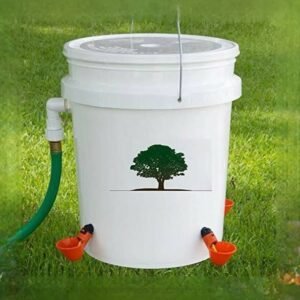
Winter Water Woes: A Farmer’s Struggle
As the cold grip of winter tightens, farmers face a myriad of challenges, chief among them being the task of ensuring their animals have access to unfrozen water. There’s a particular frustration that comes with discovering frozen hoses in the early morning hours, turning a simple chore into a battle against the elements. The struggle is all too real, and every farmer can relate to the dread of dealing with frozen pipes and empty water troughs.
The Unlikely Solution: Pool Noodles to the Rescue
But what if there was a solution that was as ingenious as it was unexpected? Enter the humble pool noodle – a summertime staple that might just hold the key to solving your winter water problems. It might sound unconventional, even a bit absurd, but trust me, this simple hack has the potential to save you from hours of frustration when temperatures plummet.
I’ll never forget the winter when I reached my breaking point. Frozen hoses seemed to mock me at every turn, and I was running out of ideas. That’s when my neighbor, always one to think outside the box, suggested using pool noodles. At first, I couldn’t help but laugh at the idea. But desperate times call for desperate measures, so I decided to give it a shot – and I’m so glad I did.
In this article, I’ll share how pool noodles transformed my winter watering routine and offer practical tips for implementing this unexpected solution on your own farm. So, let’s dive into how these colorful foam tubes can become your unlikely heroes during the coldest months of the year.
The Science Behind Frozen Hoses
Before we delve into the magic of pool noodles, let’s take a moment to understand why hoses freeze in the first place. When temperatures drop below freezing, water left inside hoses begins to solidify, starting from the outside and working its way in. Even after you’ve drained the hose, residual water can linger in the dips and coils, where it’s prone to freezing. This not only renders the hose useless but can also cause damage over time.
Introducing Pool Noodles: Your Winter Watering Solution
So, how exactly can pool noodles save the day? The secret lies in their hollow centers, which can serve as makeshift conduits for water. Instead of relying on hoses that are prone to freezing, you can use pool noodles to transport water directly from your faucet to your livestock waterers. It’s a simple yet remarkably effective solution that bypasses the need for hoses altogether.
Here’s how to set up your pool noodle water system:
- Connect to the Faucet: Attach the first pool noodle directly to your water faucet, ensuring a snug fit to prevent leaks.
- Extend with More Noodles: Connect additional pool noodles end-to-end to reach the necessary distance, securing the connections with waterproof tape if needed.
- Direct to the Waterers: Position the end of the last noodle over your livestock waterer, ensuring a secure placement to avoid spillage.
Why It Works
Pool noodles are less prone to freezing because water moves through them quickly, preventing ice buildup. Additionally, their foam material provides some insulation, further protecting the water from the cold. It’s a straightforward, cost-effective solution that can be set up in minutes, saving you from the hassle of dealing with frozen hoses.
Addressing Common Questions
- Can pool noodles withstand cold temperatures?: Yes, pool noodles are made from polyethylene foam, which doesn’t freeze or become brittle in cold weather.
- How should you store your pool noodle setup after winter?: Simply disconnect the noodles, allow them to dry, and store them in a dry place to prevent mold or mildew.
- Will the water freeze inside the noodles if left idle?: While stagnant water can freeze, continuous flow during use significantly reduces the risk of freezing.
Embrace Innovation on the Farm
In conclusion, don’t let frozen hoses dampen your spirits this winter. With a bit of creativity and resourcefulness, you can overcome this common challenge and ensure your animals have access to water when they need it most. So, why not give pool noodles a try and see the difference they can make on your farm? After all, farming is all about adapting to the unexpected and finding solutions where others see problems. Here’s to a winter of innovation, ingenuity, and well-hydrated animals!




